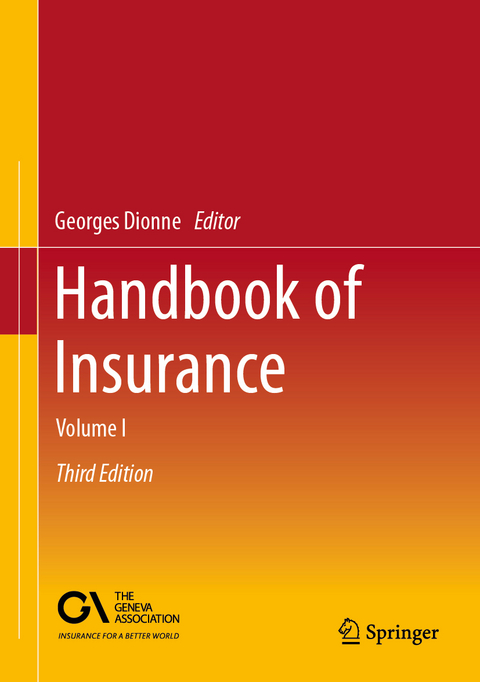
Handbook of Insurance
Springer International Publishing (Verlag)
978-3-031-69560-5 (ISBN)
- Noch nicht erschienen - erscheint am 02.02.2025
- Versandkostenfrei
- Auch auf Rechnung
- Artikel merken
The Handbook of Insurance reviews the last fifty years of research developments in insurance economics and its related fields. A single reference source for professors, researchers, graduate students, regulators, consultants, and practitioners, the book starts with the history and foundations of risk and insurance theory, followed by a review of prevention and precaution, asymmetric information, insurance fraud, risk management, insurance pricing, new financial innovations, reinsurance, corporate governance, capital allocation, securitization, systemic risk, insurance regulation, the industrial organization of insurance markets, and other insurance market applications. The new edition covers many topics that have risen in importance since the 2nd edition, such as climate risk, pandemic risk, insurtech, digital insurance, cyber risk, behavioral economics, Solvency II, corporate governance, enterprise risk management, and machine learning.
This edition of the Handbook contains 17 new chapters. Each of the chapters is written by leading international authorities in risk and insurance research. All contributions are peer reviewed, and each chapter can be read independently of the others.
It is a tour de force to provide to the insurance industry and its stakeholders a structured, complete, intelligent and critical synthesis of insurance economics in the twenty-first century. This is what you have in your hands. This third edition of the Handbook of Insurance should be the bible to anyone who wants to have a deep understanding of the complex challenges faced by insurance and reinsurance markets to create the large social value of risk sharing and risk diversification.
Christian Gollier, Director of the Toulouse School of Economics
This collective work not only offers a remarkable synthesis of cutting-edge research in insurance economics but also provides a rare resource, both comprehensive and authoritative, for professionals seeking a deeper understanding of insurance industry fundamentals and emerging trends. The content of the Handbook reflects the richness and dynamics of the field and underlines the many facets involved in better understanding how insurance works and contributes to society.
Kai-Uwe Schanz, Deputy Managing Director, Head of Research & Foresight, The Geneva Association
Georges Dionne is Full professor of Finance and holds the Canada Research Chair in Risk Management at HEC Montréal. He has published extensively: He has published seven books on insurance and risk management and more than 180 articles in academic journals. He has been the Editor of the Journal of Risk and Insurance, and is a member of the scientific committee of seven journals. He has supervised more than 35 Ph.D. theses and more than 100 research activities at the Master level (thesis and projects). He became Fellow of the Canadian Economics Association in 2019 and has received numerous awards for his research and teaching including the John S. Bickley Founders Award of the International Insurance Society in 2016.
Part 1 History - Developments in risk and insurance economics: The past 50 years.- Part 2 Climate risk protection - Fifty years of US natural disaster insurance policy.- Climate risk and insurance.- Household financial resilience after severe climate events: The role of insurance.- Insuring wildfires globally.- Catastrophe bonds.- Part 3 New challenges - Cyber risk and cyber insurance.- Digital insurance and insurTech.- Pandemic risk management and insurance.- Part 4 Life insurance and social insurance - Life insurance financial products.- Private equity investments in the life insurance industry.- Insurance: Private or social?.- Part 5 Empirical models - Causality in empirical analyses with emphasis on asymmetric information and risk management.- Econometrics of insurance based on telematics information and machine learning.- Data science for insurance fraud detection: A review.- Nonnegative second-order semiparametric analysis and experience rating in non-life insurance.- Efficiency in the insurance industry.
| Erscheint lt. Verlag | 2.2.2025 |
|---|---|
| Zusatzinfo | XXV, 508 p. 50 illus., 37 illus. in color. |
| Verlagsort | Cham |
| Sprache | englisch |
| Maße | 178 x 254 mm |
| Themenwelt | Wirtschaft ► Betriebswirtschaft / Management ► Finanzierung |
| Schlagworte | Allocation • Behavioral insurance • Causality in econometrics • Climate Risk • Corporate insurance • cyber risk • Digital Insurance • Enterprise Risk Management • Fraud • History of insurance economics • insurance • insurance fraud detection • Insurtech • Liability • Life insurance products • machine learning • Markets • Microinsurance • Model • Moral Hazard • Pandemic risk • Private equity in life insurance • reinsurance • Risk • Risk classification • Solvency regulation • systemic risk • Telematics information |
| ISBN-10 | 3-031-69560-7 / 3031695607 |
| ISBN-13 | 978-3-031-69560-5 / 9783031695605 |
| Zustand | Neuware |
| Informationen gemäß Produktsicherheitsverordnung (GPSR) | |
| Haben Sie eine Frage zum Produkt? |
aus dem Bereich


